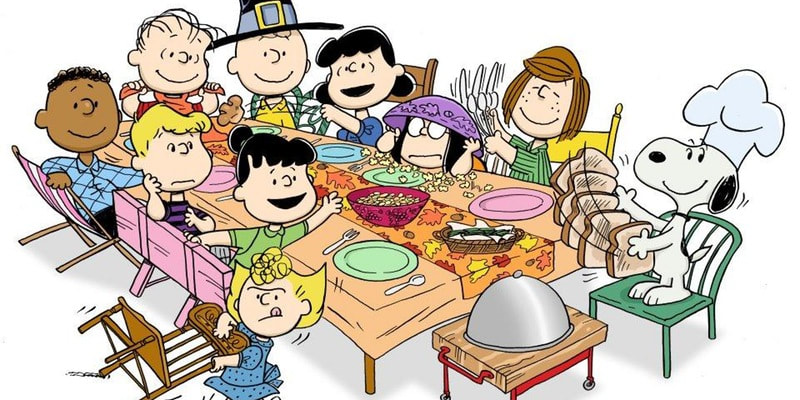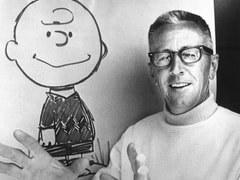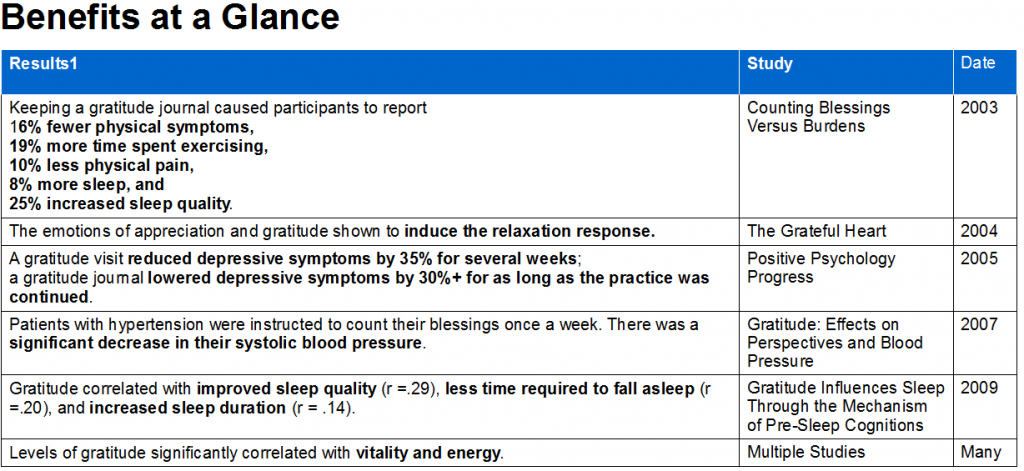www.simonandschuster/Charlie-Brown-Thanksgiving
© 2016 Peanuts Worldwide LLC

I started this pre-Thanksgiving blog with every intention of updating my more-or-less historic look at Thanksgiving and how it became a holiday. In the process I ran onto an old quote from Charlie Brown in the comic strip Peanuts.
"What if, today, we were grateful for everything?”
While they seem to mean the same thing, and people often use them interchangeably, the two words don’t feel the same. And I noticed Charles Schulz used the word “grateful” rather than “thankful”, even though the original comic strip related to Thanksgiving.
WHEN IN DOUBT
When in doubt, go to the experts; my mother taught me to look up everything in the dictionary. So as not to favor one source over another, I looked the words up in three dictionaries.
The Merriam-Webster Dictionary
● “Thankful” = “pleased and conscious of benefit received; expressive of thanks.”
● “Gratitude” = “appreciative of benefits received; expressing gratitude.”
The Oxford Dictionary
● “Thankful” = “pleased and relieved.”
● “Grateful” = "feeling or showing an appreciation for something done or received."
The Cambridge Dictionary
● “Thankful” = “pleased or grateful.”
● “Grateful” = “showing or expression thanks, esp. to another person.”
LIVE OUT YOUR GRATITUDE
While the words and definitions all look similar, many sources commenting on this issue interpret the difference as Tessa Masula does in her article in The Odyessey Online
[https://www.theodysseyonline.com/difference-thankful-grateful].
“Being thankful is a feeling. Being grateful is an action.”
In that respect, Thanksgiving is a holiday dedicated to being thankful. For these few days per year, most of us in the United States focus our thoughts on feelings of thankfulness for the wonderful things in our lives. There is certainly nothing wrong with that. It’s awesome.
Source: http://tbc.life/event/charlie-brown-thanksgiving/ Source: www.fandango.com/charles-m-schulz
Even more awesome, however, is focusing our lives, every day, on showing our gratefulness by doing things to pass on the feeling of thankfulness to others. You can make a difference, one life at a time.
Besides being good for others, experts and studies tell us practicing gratefulness in our lives is good for us and the benefits can alter our lives. Unfortunately, human beings are not hardwired to be grateful. We have to work at it and practice a lot.

◄ GRATITUDE Practicing Gratitude Can Make You Happier" says it’s good for us in the following ways.
● Gratitude makes us feel more gratitude.
While in a grateful mood, we will feel gratitude more frequently, when we do feel gratitude it will be more intense and held for longer, and we will feel gratitude for more things at the same time. In five words – gratitude triggers positive feedback loops.

● Gratitude makes people like us.
Outwardly showing gratitude makes us nicer, more trusting, more social, and more appreciative. As a result, it helps us make more friends and deepen existing relationships. We’re nicer to be around.

Gratitude makes you a more effective manager, helps you network, increases your decision making capabilities, your productivity, and helps you get mentors and protégés. As a result, gratitude helps you achieve your career goals, as well as making your workplace a more friendly and enjoyable place to be.
● Gratitude strengthens our emotions and helps develop our personalities.

Some people spend way too much time thinking about themselves, and too little thinking about others. As compassion and gratitude practices develop, you may feel spontaneous urges to help others.

Materialism is strongly correlated with reduced well-being and increased rates of mental disorder. There’s nothing wrong with wanting more. The problem with materialism is that it makes people feel less competent, reduces feelings of relatedness and gratitude, reduces their ability to appreciate and enjoy the good in life, generates negative emotions, and makes them more self-centered.

Imagine a world where no one helps you. Despite your asking and pleading, no one helps you.
Now imagine a world where many people help you all of the time for no other reason than that they like you. In which world do you think you would have more self-esteem? Gratitude helps to create a world like that. How does gratitude create a more supportive social dynamic?

Our memories are who we are, and they are not set in stone. Memories of events, people, everything we experience can change over time. We can remember things as being worse than they actually were, as being longer or shorter, as being funnier or sadder, people as being kinder or crueler, as being more or less interesting, etc.
Experiencing gratitude in the present makes us more likely to remember positive memories. Also, it can mutate some of the neutral or even negative memories into positive ones.

Spiritual transcendence is highly correlated with feelings of gratitude. That is – the more spiritual you are, the more likely you are to be grateful. This is for two reasons: 1) All major religions espouse gratitude as a virtue, and 2) Spirituality spontaneously gives rise to grateful behavior.

The list goes on and on, but you get the idea. In fact, living our your gratitude is supposed to do just about everything from making you look better and more inclined to exercise to washing your underwear (well, almost that).
Gratitude helps us realize what we have, and awareness of what we're grateful may reduce the tendency to want more all the time. Notice your everyday world from the viewpoint of gratitude. It’s astounding the good things we take for granted, and the not-so-good things we focus on.
So be thankful on Thanksgiving for all the wonderful things in this world, and even some of the not-so-wonderful. Be grateful every day you live and in the way you live, and things will be better than ever.
HAPPY TURKEY DAY!
Sources:
https://thepeacefulyogini.wordpress.com/2014/12/20/gift-it-forward-pay-it-forward-this-holiday-season/
https://www.unstuck.com/gratitude/
https://www.happierhuman.com/benefits-of-gratitude/
https://gratefulness.org/resource/what-is-gratitude/
https://www.goodhousekeeping.com/life/a45386/gratitude-lists-dont-work/
https://greatergood.berkeley.edu/article/item/what_parents_neglect_to_teach_about_gratitude
ww.google.com/search?q=difference+between+thankful+and+grateful&oq=Difference+between+thankful+&aqs=chrome.0.0j69i57j0l4.11044j0j8&sourceid=chrome&ie=UTF-8Z
https://www.theodysseyonline.com/difference-thankful-grateful
https://culturedindividuals.wordpress.com/2012/09/13/materialism-agree-disagree-or-what/
http://www.simonandschuster.com/books/A-Charlie-Brown-Thanksgiving/Charles-M-Schulz/Peanuts/9781481468053
http://clipart-library.com/kindness-cliparts.html
https://www.saba.com/blog The Science of Praise: A Manager’s Guide To Giving Effective Employee Praise











 RSS Feed
RSS Feed